
Date: 2026-03-03 Page is: DBtxt003.php txt00028628
GLOBAL OVERVIEW
JOE BLOGS ... june 8th 2025
RUSSIA's Shock Decision
JOE BLOGS ... june 8th 2025
RUSSIA's Shock Decision
Original article: https://www.youtube.com/watch?v=IKLNZCXgz0M
Peter Burgess COMMENTARY
Peter Burgess
- https://www.buymeacoffee.com/JoeBlogs / joeblogsyt
- YouTube Membership - / @joeblogs
- YouTube Super Thanks (click below)
- 0:00 Intro
- 0:40 INFLATION
- 3:10 INTEREST RATES
- 6:08 RUBLE
- 12:14 SUMMARY & CONCLUSION
Transcript
- ntro
- 0:00
- hi welcome back to Joe Blogs in today's
- episode I want to talk to you about
- what's happening in the economy in
- Russia and specifically to talk about
- the shock decision that the Bank of
- Russia announced that it decided to cut
- interest rates from 21% to 20% and this
- is actually the first interest rate cut
- that Russia has announced since
- September 2022 so that's almost 3 years
- ago it's 2 years and 9 months and the
- reason why this is a surprise to the
- financial markets is because of what's
- happening with inflation because
- inflation has been persistently high in
- Russia for a long period if we have a
- INFLATION
- 0:40
- look at what's been going on over the
- past 12 months with inflation you can
- see that 12 months ago in April 24
- inflation was sitting at 7.8%
- however the most recent data that's been
- published for April 25 shows that it's
- now up to
- 10.2% and if you look at the trend of
- 1:01
- this chart you can see that it has
- clearly been moving in one direction
- upwards and for the past 3 months
- February March and April they're the
- reported figures it's been above 10% and
- 10% inflation is extremely high for a
- developed economy now hang on a minute
- just before we go on a second I just
- wanted to say that a lot of people who
- are watching my videos are not
- subscribing i had a look at the data the
- other day and only around 60% of the
- people who are watching videos are
- subscribed so if you're one of those
- people if you haven't hit that
- subscriber button could you please do so
- now i don't ask this very often but just
- smash that button now because I'd like
- to get the subscribers up as high as
- possible it doesn't cost you anything
- it's not going to make a difference to
- your day but it will make a difference
- to mine and it'll make me a bit happier
- so if you could do that that would be
- really well appreciated but getting back
- to this inflation data what we're seeing
- here is a clear upward trend and if you
- follow the channel you'll be aware of
- 2:01
- the interaction between interest rates
- and inflation traditional theory tells
- us that when you have a situation like
- this in Russia where inflation is rising
- month on month what you should do is to
- increase interest rates because by
- increasing interest rates firstly it
- makes the cost of borrowing more
- expensive so if you're a company or an
- individual thinking about taking out a
- loan maybe you're thinking about
- expanding your company or buying a car
- or going on holiday or refurbishing your
- kitchen or whatever it might be if
- interest rates go up then you're
- probably going to think twice about
- making that decision and currently
- because interest rates are above 20% in
- Russia I think that would deter most
- people because 20% interest per year is
- a lot of interest to be paying but if
- you want to bring inflation down that's
- what you should do as a central bank you
- should be increasing your interest rate
- 3:00
- but as I said right at the start of
- today's video Russia despite the fact
- that inflation is sitting above 10% have
- just announced a reduction in interest
- INTEREST RATES
- 3:10
- rates and if we look at what's been
- happening over the past 5 years you can
- see that it's been a really interesting
- movement in interest rates in Russia
- immediately following the invasion of
- Ukraine which started in February
- 2022 interest rates were increased to
- 20% and at that time it was announced
- that that was an emergency rate that was
- being brought in for a short period of
- time to reflect the special war
- situation that was going on in Ukraine
- it wasn't actually referred to as a war
- it was a special economic situation i
- can't even remember what the name of it
- was i'm sure lots of people send me a
- message reminding me what that was but
- the 20% at that point was seen to be a
- short-term measure you can see that
- interest rates did come down rapidly and
- interestingly they actually came down to
- 4:00
- a lower level than they'd been at before
- the war started which was a surprise to
- everybody at the time because if we have
- a look at what was going on with
- inflation at that point you can see that
- at the start of 2022 inflation was
- sitting at around 5 or 6% now
- immediately following the invasion of
- Ukraine it spiked and it rose to above
- 16% but despite the fact that interest
- rates started to come down so did
- inflation and this caused a lot of head
- scratching in the Western world nobody
- could really fathom why inflation was
- going down at the same time as all of
- the sanctions that have been applied
- against Russia were making things much
- more expensive so inflation should have
- been going up for that reason and also
- the value of the ruble collapsed
- following the invasion of Ukraine and
- that should have made the all of imports
- way more expensive because if you're
- having to buy things in the rubble
- equivalent and your currency is falling
- in value that should push up prices but
- 5:02
- remarkably it didn't and inflation came
- down to a low of
- 2.3% by the middle of 2023 which was
- actually a lot lower than inflation was
- in most developed economies at that time
- so um nobody was really quite sure how
- that happened but since the middle of
- 2023 as you can see from this chart
- inflation has been on the rise and is
- now up above 10% as we've just discussed
- and in terms of what has been going on
- with interest rates since 2023 you can
- see that they've also been on the rise
- so this is following the traditional
- pattern that we would have expected we
- expect the Bank of Russia or any central
- bank to increase interest rates at a
- time when you have rising inflation so
- the fact that interest rates have now
- been reduced despite the fact that
- inflation is sitting at its highest
- point since the end of
- 6:01
- 2022 is slightly unusual so raises the
- question as to why this is happening now
- RUBLE
- 6:08
- if we have a look at what's going on
- with the value of the ruble because
- whenever I make a video about Russia
- everybody sends me lots of messages
- about the ruble people who are
- supporting the Russian economy are
- always pointing out that the ruble is
- doing really well now we look at this
- chart that shows the movement over the
- past 12 months you can see that at the
- end of
- 2024 the ruble value had got down to its
- worst position for a long period of time
- against the US dollar it was trading at
- above 110 rubles which is an an absolute
- disaster from Russia's point of view now
- that actually proved to be um the
- turning point and you can see that since
- the start of 2025 the ruble has
- strengthened significantly and is now
- trading for around 80 to1 US scale of
- this chart to show what's been happening
- 7:00
- over the past 5 years you can see that
- the current level is on par with where
- the ruble was trading back in 2021 which
- was before the war in Ukraine started um
- you can see that the invasion of Ukraine
- in February 22 had a disastrous impact
- on the value of the ruble it fell to
- almost 130 to1 US the Bank of Russia
- then stepped in and started buying
- rubles and artificially inflated the
- value and at one point in the middle of
- 2022 it was trading at around 50 to1 US
- which is the strongest it had been at
- for a long period of time but over the
- past 3 years we've seen a deterioration
- in the value of the ruble however that
- has turned around over the past six
- months and there's no real explanation
- for that the only explanation I can give
- you is that the size of the market for
- the ruble is now very very small because
- not many countries are dealing in rubles
- in fact it's pretty much only Russia and
- 8:01
- countries that don't have a choice who
- are dealing with Russia that are
- basically being told to use rubles such
- as Cuba or Venezuela that they've been
- told to use rubles but India and China
- who are the biggest trading partners for
- Russia today have refused to make
- payments in rubles they basically said
- 'We're not doing it.' So China will only
- make payments in its own currency the
- Chinese yuan and India initially wanted
- to make those payments in Indian rupees
- russia said 'Well actually that doesn't
- work for us because nobody else wants to
- accept Indian rupees so we can't use
- that currency for anything else it's
- useless to us.' So they're now dealing
- in a mixture of Chinese yuan and United
- Arab Emirates dirhams so the market for
- the ruble is now really small and what
- that does is enables the Bank of Russia
- to be able to control the price because
- they can buy and sell rubles in the
- small market to keep it at the level
- that they want it to and it's
- interesting that it's now trading at
- 9:00
- that sort of level that it was at in
- 2021 which clearly is a rate that the
- Bank of Russia is comfortable with but
- if we jump back and have a look at the
- last 12 months this strengthening in the
- value of the ruble in theory should have
- actually reduced inflation because if
- the ruble is worth more each month than
- it was previously then that means that
- you have more purchasing power the ruble
- equivalent of whatever the price is in
- the international market for things that
- Russia is importing is going up and
- therefore inflation should have been
- going down but if we look at the
- inflation chart for the past 12 months
- you can see that the opposite has been
- happening inflation has actually been
- going up and what that tells us is that
- the ruble isn't being used to buy
- anything it's not actually got any
- purchasing power in the global market so
- the value of the ruble is now
- disconnected from the Russian economy so
- anybody that's sending me messages
- saying the rubles's doing really well
- therefore Russia's doing really well
- isn't really looking at the data because
- 10:02
- the data isn't telling us that the data
- is telling us that inflation is
- continuing to rise despite the fact that
- the ruble has been strengthening in
- value and if we go back to the interest
- rate chart the fact that Russia has now
- reduced its interest rates despite the
- fact that it's got persistently high
- inflation significantly higher than most
- developed economies around the world
- tells us that there are now problems in
- the Russian economy now we've been
- talking about problems in the Russian
- economy for a long period of time but
- Russia hasn't really been accepting that
- there's been no acknowledgement that
- Russia is struggling but the fact that
- interest rates are now being lowered
- tells us that there is a reduction in
- growth in the Russian economy because
- that's the other reason why you would
- reduce interest rates you'd reduce them
- if inflation was down at the level where
- you wanted it to be or if you're not
- seeing growth because reducing interest
- rates encourages companies and
- individuals to start borrowing again it
- 11:00
- makes it cheaper and therefore it should
- mean that those companies and
- individuals then spend that money and
- when you start spending in the economy
- then hopefully that fuels growth and
- increases GDP so this is the fundamental
- reason why Russia has reduced interest
- rates and the reason why it has been a
- surprise to the markets is because of
- what's going on with inflation because
- as a central bank you always have that
- really difficult dilemma behind either
- controlling inflation or stimulating
- growth and if we talk about what's going
- on in the USA at the moment Donald Trump
- is very keen for the Fed to reduce
- interest rates because he wants to
- stimulate growth he wants to boost GDP
- but Jerome Powell from the Fed isn't
- doing that because he's watching what's
- going on with inflation and Donald
- Trump's tariffs and he's concerned that
- if he reduces interest rates it could
- cause inflation to get out of control so
- you've always got that trade-off between
- what's happening with inflation and
- what's going on with the economy itself
- 12:00
- but what we're seeing in Russia right
- now is that the slowdown in the economy
- is overriding the problems with
- inflation and that's caused the central
- bank to reduce interest rates
- surprisingly so what's the summary and
- SUMMARY & CONCLUSION
- 12:16
- conclusion today well I wanted to post
- this video because this announcement
- that the Bank of Russia has reduced
- interest rates was a surprise to me and
- the markets because of what's been going
- on with inflation because we've been
- expecting interest rates to actually
- rise to maybe 25 or even 30% at some
- point during 2025 if Russia wanted to
- get back to its target inflation rate of
- 4% cuz 10% is a long way above 4% but
- what we've seen is that the Bank of
- Russia which was coming under pressure
- from President Putin to reduce rates in
- exactly the same way as we're seeing in
- the USA where Donald Trump is trying to
- encourage the Fed to reduce interest
- rates despite inflation staying higher
- 13:00
- than it wants it to be the Bank of
- Russia has now agreed with President
- Putin that interest rates do need to
- start coming down they've only come down
- by 1% though from 21% to 20% so I don't
- think that's going to make a material
- difference if I'm offering you a loan
- and I tell you that I could do it at 21%
- and then I come back to you a week later
- and say 'Actually I've looked at my
- numbers again I could do it for 20%.' Is
- that going to make a material difference
- to you i don't think it would i think
- you'd probably say '20% 21% doesn't
- really make any difference i don't want
- to take that loan it's too expensive.'
- But the Bank of Russia have reduced
- interest rates for the first time since
- September 2022 so what this tells us is
- that we're now likely to see a
- succession of interest rate reductions
- that was what we saw back in 2022 when
- interest rates rose to 20% we then saw a
- rapid reduction down to 7 12% and it
- might be that we see a similar thing
- 14:00
- happening now and the big question is
- what's going to happen to inflation if
- the Bank of Russia does decide to do
- that because as we've talked about if
- you reduce interest rates usually you
- would expect inflation to start rising
- again and the last thing that Russia
- needs at the moment is higher inflation
- because it's still operating in a
- wartime economy because a lot of
- companies have been commandeered by the
- state and they're working directly for
- the Kremlin to produce things for the
- war in Ukraine that's driven up wages
- because all of those companies have been
- offering higher wages to attract in more
- staff to make sure that they're fully
- occupied and they can produce as much as
- they can to make the maximum amount of
- money from the Kremlin but that's driven
- up wages across the board and lots of
- companies are now struggling with those
- higher wages the higher wages have
- resulted in more spending in the economy
- which has driven up inflation so it is a
- surprise that the Bank of Russia have
- reduced interest rates as a result of
- the fact that the economy is now slowing
- 15:00
- down because Russia has been
- self-funding itself it's been paying all
- of these higher wages to all of these
- companies which has been growing the
- economy but that growth is now running
- out of steam so the Bank of Russia is
- having to reduce interest rates to try
- to restimulate the economy and what this
- tells us is that the economy is starting
- to fracture in Russia the wartime
- economy can't last forever it won't be
- self- sustainable for the long term
- because Russia has to fund that from
- somewhere it's been funding it from its
- national wealth fund as I've talked
- about in previous videos the National
- Wealth Fund is now depleting it doesn't
- have enough money to carry on with this
- strategy forever and so the Bank of
- Russia is now stepping in trying to get
- the economy back on track to make sure
- that Russia is self-funding but what it
- tells us is that interest rate cuts are
- an indication of a slowdown in the
- economy that slowdown is because Russia
- isn't making the same amount of money
- from its sale of oil and gas and coal
- 16:00
- that it was historically it's running
- short of cash and if this situation
- doesn't sort itself out in the near
- future Russia is going to have a serious
- problem so hopefully you've enjoyed
- today's video you found it useful
- informative and thoughtprovoking if
- you've liked what I've said then please
- give me a thumbs up thank you for
- watching this video all the way through
- to the end and thank you to anyone that
- has subscribed if you haven't please
- smash that subscriber button as I said
- right at the start of today's video and
- thank you so much to everyone that's
- supporting me if you've bought me a
- coffee or sent me a YouTube super thanks
- really appreciate that thank you so much
- and if you're a long-term supporter
- either through Patreon or YouTube
- membership or buy me a coffee membership
- thank you for that support really helps
- keep me motivated and here's something
- to put a smile on your face
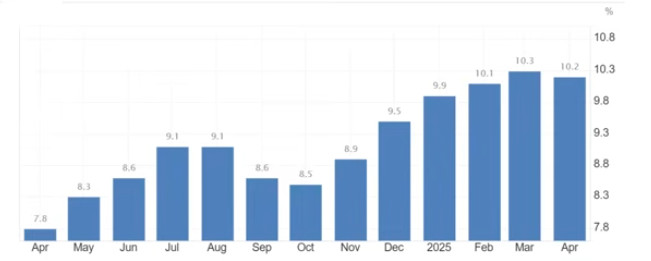
Russian Inflation Rate
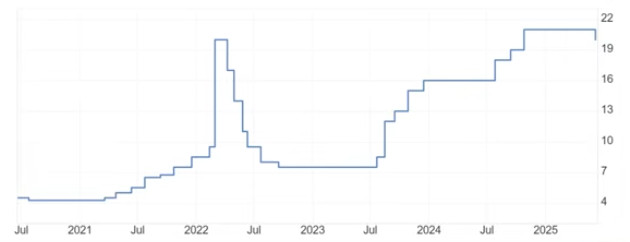
Russian Interest Rates
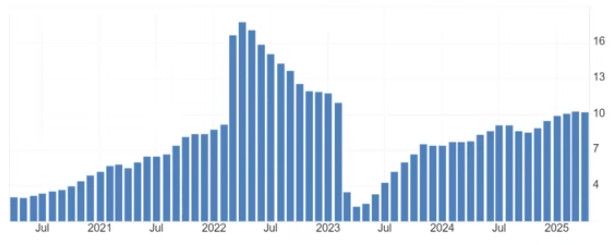
Russian Inflation
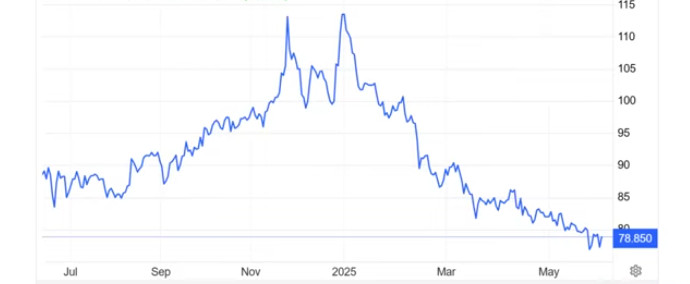
Value of Russian Rouble (2024-2025)
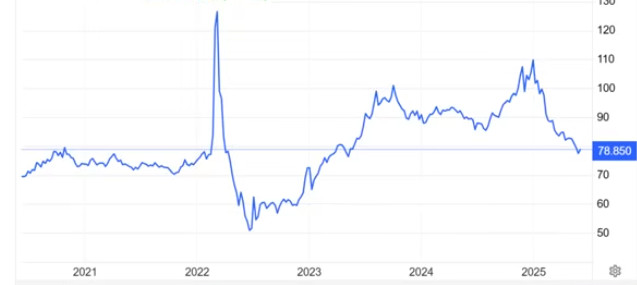
Value of Russian Rouble (2005-2025)